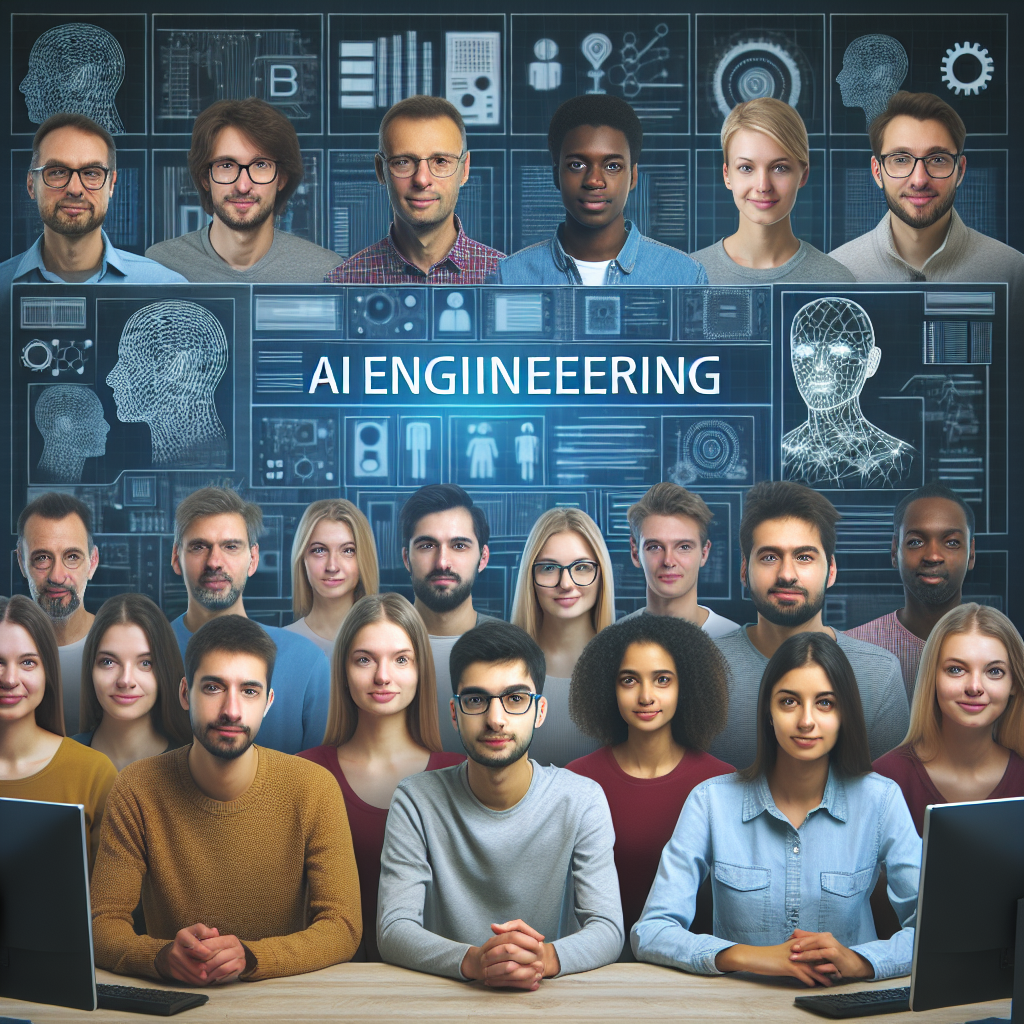Unlock the Future: Training Engineers in AI, Exploring Careers as AI Engineers, and Navigating the 2024 Landscape of Artificial Intelligence Opportunities

How to Become an AI Engineer in 2024: Your Pathway to Success

Are you fascinated by the potential of artificial intelligence? Do you dream of becoming an AI engineer in 2024? You’re not alone! ⭐ With AI technology rapidly advancing, there’s a growing demand for skilled professionals in this exciting field. In this section, we’ll break down key steps for aspiring engineers, explore the necessary skills, and discuss what the job market looks like for new talent in AI engineering.
1. Understanding the Role of an AI Engineer
An AI engineer designs and develops systems that can mimic human behavior through machine learning and other technologies. This role combines programming, mathematics, and data analysis to create smart solutions that enhance various industries. According to recent statistics, job opportunities for AI engineers are expected to grow by over 22% over the next five years! ⭐ That means there’s plenty of room for newcomers.
Imagine being part of a team that develops AI for healthcare, enabling faster diagnosis and treatment. Or consider the excitement of working with autonomous vehicles that can navigate traffic. The potential is limitless!
2. The Educational Path
To start your journey, a solid education is crucial. Here’s a roadmap for your training:
- ⭐ Bachelor’s Degree: In fields like computer science, mathematics, or engineering.
- ⭐ Master’s degree: Specialized programs in AI can give you an edge.
- ⭐ Online Courses: Consider platforms like Coursera or Udacity, offering courses in AI and machine learning.
- ⭐ Hands-On Projects: Build a portfolio by working on practical AI projects, showcasing your skills to potential employers.
3. Essential Skills for AI Engineers
What skills do you need to become an AI engineer? Here’s a concise list:
- ⭐ Programming Languages: Python, R, or Java are commonly used in AI development.
- ⭐ Mathematics: A strong grasp of calculus, linear algebra, and statistics.
- ⭐ Machine Learning: Understanding algorithms and how to implement them.
- ⭐️ Data Science: The ability to analyze and manipulate large sets of data.
4. What are the Requirements for Prompt Engineers in the Labor Market?
The demand for adept prompt engineers is surging, particularly with the rising interest in artificial intelligence in model-based systems engineering. Employers are looking for professionals who can create clear, effective prompts to interact with AI systems. Those who master prompt engineering often find themselves at a significant advantage in the labor market. ⭐ Statistical insights show that companies prioritizing AI talent are willing to offer salaries upwards of €80,000 annually!
5. Real-Life Examples
Consider Alex, a 24-year-old graduate who entered a software development boot camp focused on AI. After six months of immersive learning and hands-on training in AI technologies, he landed a job with a leading tech company. His responsibilities involve developing AI-driven solutions for optimizing logistics, and he’s thrilled about the impact of his work!
Then theres Sarah, a mid-career professional who decided to pivot to AI after attending a training program. She had a background in business analytics but saw the potential of becoming an AI engineer. With dedication and guidance from experts, she has helped her firm implement AI strategies, resulting in a 30% increase in efficiency! ⭐
6. Expert Advice for Aspiring AI Engineers
To successfully navigate your path to becoming an AI engineer, follow this sage advice from industry experts:
- ⭐ Network: Attend conferences and seminars where you can meet established engineers and learn about the latest trends.
- ⭐ Stay Updated: AI is a rapidly evolving field. Regularly read journals, blogs, and attend workshops.
- ⭐ Seek Mentorship: Finding a mentor can provide guidance and valuable insights into the industry.
7. Start Your Journey with Us!
Ready to take the next step towards becoming an AI engineer? At Artivale, we offer comprehensive training programs to fast-track your journey. You’ll learn from professional specialists with over 20 years of experience. Plus, our all-in-one services mean you won’t have to juggle multiple companies. We ensure a smooth training process tailored to your needs. ⭐ Contact us at [email protected] or visit artivale.com to sign up today!
| Skills Required | Industries | Potential Salary (EUR) |
| Programming (Python, R, etc.) | Healthcare | 80,000 |
| Mathematics knowledge | Automotive | 85,000 |
| Machine Learning | Finance | 90,000 |
| Data Analysis | Retail | 75,000 |
| AI Systems Engineering | Logistics | 82,000 |
| Cloud Computing | Telecommunications | 78,000 |
| Soft Skills | Various industries | 70,000 |
| Networking | Startups | 65,000 |
| Cybersecurity Awareness | Government | 76,000 |
| AI Ethics Knowledge | Nonprofits | 72,000 |
Don’t wait to embrace the future. Become an AI engineer today and unlock exciting career opportunities! Call us or visit our website to learn more about our training programs. Your future begins now! ⭐
Frequently Asked Questions
- What qualifications do I need? A bachelor’s degree in computer science or a related field is recommended.
- How long does it take to train as an AI engineer? Most training programs range from six months to two years, depending on your commitment level.
- What technologies should I focus on? Focus on machine learning frameworks, programming languages like Python, and data science tools.
- Are there online courses available? Absolutely! Many universities and platforms like Coursera offer comprehensive online courses in AI.
- What job opportunities will be available? Positions vary from data analyst to machine learning engineer, and AI consultants.
- What salary can I expect as an AI engineer? Entry-level positions can expect around €65,000, while experienced engineers earn much more.
- Is coding required? Yes, a good foundation in programming is crucial for most AI engineering roles.
- Are there certifications available? Yes, several reputable certifications can enhance your qualifications.
- How can I gain practical experience? Engage in internships or personal projects to build your portfolio.
- What is the future of AI engineering? The field is expected to grow significantly, making it a lucrative and fulfilling career choice.
What I Think About the Prospects of the Engineer-Consultant with Artificial Intelligence

Have you ever considered what it means to be an engineer-consultant specialized in artificial intelligence? The career prospects in this domain are not just bright—theyre downright dazzling! ⭐ With technological advancements reshaping industries, the role of an AI engineer and consultant is becoming increasingly vital.
The Need for AI Consultants
As businesses strive to integrate AI solutions, the demand for expert guidance has surged. Companies often face challenges in understanding how to leverage artificial intelligence to improve their operations. Thats where engineer-consultants step in. They bridge the gap between complex AI technologies and practical business applications, helping organizations maximize their potential.
According to statistics, nearly 70% of companies report that they struggle with implementing AI solutions effectively. This gap creates a massive opportunity for engineering consultants who can provide not only technical support, but also strategic advice tailored to each clients unique challenges. It’s no longer just about coding; its about understanding business needs and aligning AI strategies with them.
Career Growth and Opportunities
The career outlook for engineer-consultants in AI is impressive. Heres a snapshot of what to expect:
- ⭐ Growing Demand: The global AI market is projected to reach €500 billion by 2024, which means ample job opportunities for skilled professionals.
- ⭐ Diverse Industries: From healthcare to finance, almost every sector is adopting AI technologies, which means a wide array of consulting roles.
- ⭐ Attractive Salaries: Reports show that AI consultants can command salaries reaching up to €100,000 a year, depending on experience and specialization!
Real-World Applications and Scenarios
Consider Maria, a recently graduated AI engineer who transitioned into consulting. Her first major project involved advising a healthcare provider on implementing AI for patient management. By analyzing existing workflows and applying machine learning, Maria helped reduce patient wait times by 30%. ⭐ Clients like Marias often find that an engineer-consultant can significantly improve efficiency and profitability, leading to enhanced trust and long-term partnerships.
In another instance, a financial institution hired John, an engineer-consultant, to integrate AI in fraud detection systems. He implemented an AI-driven model that analyzed transaction patterns in real time, resulting in a 40% decrease in fraudulent activities! This showcases how valuable an engineer-consultant can be in identifying problems and devising effective solutions.
Key Skills for Engineer-Consultants
So, what skills do you need to thrive as an engineer-consultant in AI? Here’s a list of the most essential skills:
- ⭐ Technical Expertise: Deep knowledge of AI technologies, machine learning, and data analysis.
- ⭐ Problem-Solving Skills: The ability to identify business problems and propose AI-driven solutions.
- ⭐ Communication Skills: Translating complex technical concepts into easily understandable terms for clients.
- ⭐ Project Management: Skills to oversee and manage projects effectively, ensuring timely delivery.
Future Outlook: What Lies Ahead?
The future for engineer-consultants in AI is set to be transformative. With rapid technological advancements, engineers who are well-versed in AI and machine learning will stand at the forefront of innovation. As these technologies evolve, there will be new challenges to tackle and exciting projects to engage in.
Experts predict that by 2030, the demand for AI consultants will double, making this an opportune time for new talent to enter the field. If you’re considering a career as an AI engineer or consultant, now’s the time to act! Don’t miss out on the chance to become a key player in shaping the future of technology. ⭐
Get Started with Artivale Today!
If youre passionate about becoming an engineer-consultant in AI, look no further than Artivale. Our tailored training programs are designed for aspiring professionals, offering hands-on experience and mentorship from seasoned experts. With over 20 years in the industry, we provide everything you need to launch your career in AI with confidence. ⭐
⭐ Ready to take the next step? Call us at [email protected] or visit artivale.com to find out more about our services and training offerings. Your future in AI consulting starts now!
Frequently Asked Questions
- What is the role of an AI engineer-consultant? They help businesses implement AI solutions and optimize their technology strategies.
- Do I need a specific degree to become an engineer-consultant? While a degree in computer science or engineering helps, practical experience and expertise are key.
- Can I become an AI consultant without extensive programming skills? Yes, understanding business needs and communication can be just as important.
- What industries are looking for AI consultants? Almost every industry, including healthcare, finance, and retail.
- How much do AI consultants earn? Salaries can reach up to €100,000 annually based on experience and expertise.
- What skills should I focus on developing? Focus on technical skills, problem-solving, and communication.
- Are there certifications for AI consultants? Yes, pursuing certifications can enhance your credibility and marketability.
- How can I gain practical experience? Consider internships, projects, or collaborating with firms seeking AI solutions.
- What does the future look like for this profession? The demand for AI consultants is expected to double by 2030, indicating strong job growth.
- How can Artivale help me? We offer comprehensive training, mentorship, and resources to help you become a skilled AI consultant.
Who Are Rapid Engineers? Mastering This Specialty Without Programming Languages

Have you ever encountered the term "rapid engineers" and wondered what it entails? ⭐ In today’s fast-paced tech landscape, the demand for agile professionals—capable of handling complex challenges quickly—is at an all-time high. But here’s the fascinating part: many of these rapid engineers are excelling without extensive knowledge of traditional programming languages!
Defining Rapid Engineers
So, who exactly are these rapid engineers? They are specialist professionals who focus on developing solutions and implementing systems efficiently. Unlike conventional engineers, they harness various tools and platforms that abstract the need for deep coding skills, allowing them to deliver results rapidly.
The beauty of rapid engineering lies in its adaptability across various industries. From healthcare to finance, these professionals use low-code and no-code platforms to create applications and solve problems effectively. ⭐ For instance, companies like Airtable and Zapier enable rapid engineers to automate workflows and build applications without the need to code from scratch. The result? Increased productivity and faster project turnaround times.
The Skills You Need to Become a Rapid Engineer
If you’re considering a career as a rapid engineer, you might be relieved to know that you don’t need to be a programming whiz! Here’s a quick list of essential skills for success:
- ⭐ Problem-Solving Mindset: The ability to identify issues and design practical solutions quickly.
- ⭐️ Familiarity with Tools: Proficiency in low-code and no-code platforms (like Microsoft PowerApps and Bubble) to build applications.
- ⭐ Collaboration Skills: Working effectively with teams across various departments to understand their needs.
- ⭐ Adaptability: A willingness to learn and experiment with new tools and techniques as technology evolves.
Real-World Applications of Rapid Engineers
Let’s look at some real-world scenarios where rapid engineers have made a significant impact!
Take Jenny, for instance. Working in a retail company, she found that sales representatives struggled to track inventory. Without any formal programming experience, she utilized a low-code platform to develop an app that allows the team to monitor stock levels in real time. Thanks to Jennys initiative, sales increased by 25% within the first quarter! ⭐
Another great example is a startup founder named David. He wanted to streamline communication between his remote team but had no coding background. By leveraging no-code tools, he created a collaborative platform that improved project management and enhanced team interaction significantly. This drastically reduced delays and increased productivity across the board!
The Advantages of Becoming a Rapid Engineer
Working as a rapid engineer has its perks. Here are a few advantages:
- ⚡ Speed of Development: Rapid engineers can bring ideas to life faster than traditional engineers, which is crucial in a competitive market.
- ⭐ Job Flexibility: Many rapid engineers work as freelancers or consultants, allowing them to choose their projects and schedules.
- ⭐ Continuous Learning: With the landscape of technology constantly evolving, you’ll be exposed to new tools and methodologies regularly.
What Industries are Embracing Rapid Engineering?
Practically every industry is on board with the rapid engineer concept. The versatility of low-code and no-code approaches means that individuals can find opportunities in:
- ⭐ Healthcare: Automating patient management systems.
- ⭐ Finance: Crafting tools for expense tracking and reporting.
- ⭐ Marketing: Developing solutions for campaign management and performance analytics.
- ⭐ Education: Creating learning management systems and interactive educational tools.
Join the Rapid Engineering Revolution at Artivale!
If you’re intrigued by the prospect of becoming a rapid engineer but unsure where to start, Artivale has you covered! Our training programs are designed to equip aspiring professionals with the necessary skills to thrive in this innovative field. With guidance from experienced specialists, you will gain hands-on experience in using low-code and no-code tools effectively. ⭐
Don’t wait! Ready to jumpstart your career as a rapid engineer? Call us at [email protected] or visit artivale.com to learn more about our offerings and take the first step toward mastering this exciting specialty.
Frequently Asked Questions
- What is a rapid engineer? A professional who utilizes low-code/no-code platforms to develop solutions quickly without extensive programming skills.
- Do I need prior experience to become a rapid engineer? No, but a problem-solving mindset and familiarity with tools can be helpful.
- What tools should I learn? Familiarize yourself with platforms like Bubble, Airtable, and Microsoft PowerApps.
- What industries utilize rapid engineering? Healthcare, finance, marketing, and education are just a few examples.
- Can I work as a freelancer? Yes! Many rapid engineers choose flexible freelance opportunities.
- How fast can I develop an application? Projects can range from a few days to weeks, depending on complexity.
- Will I still need programming skills? While not essential, basic programming understating can be advantageous.
- Are there certification programs available? Yes! Many platforms offer certifications in low-code/no-code development.
- How much can I earn as a rapid engineer? Salaries vary widely based on experience and industry, but rapid engineers can be quite lucrative!
- How can Artivale help me? We provide comprehensive training and resources to help you start your career as a rapid engineer.
Submit your details in the form and our team will personally get in touch with you within the next business day to discuss your needs
